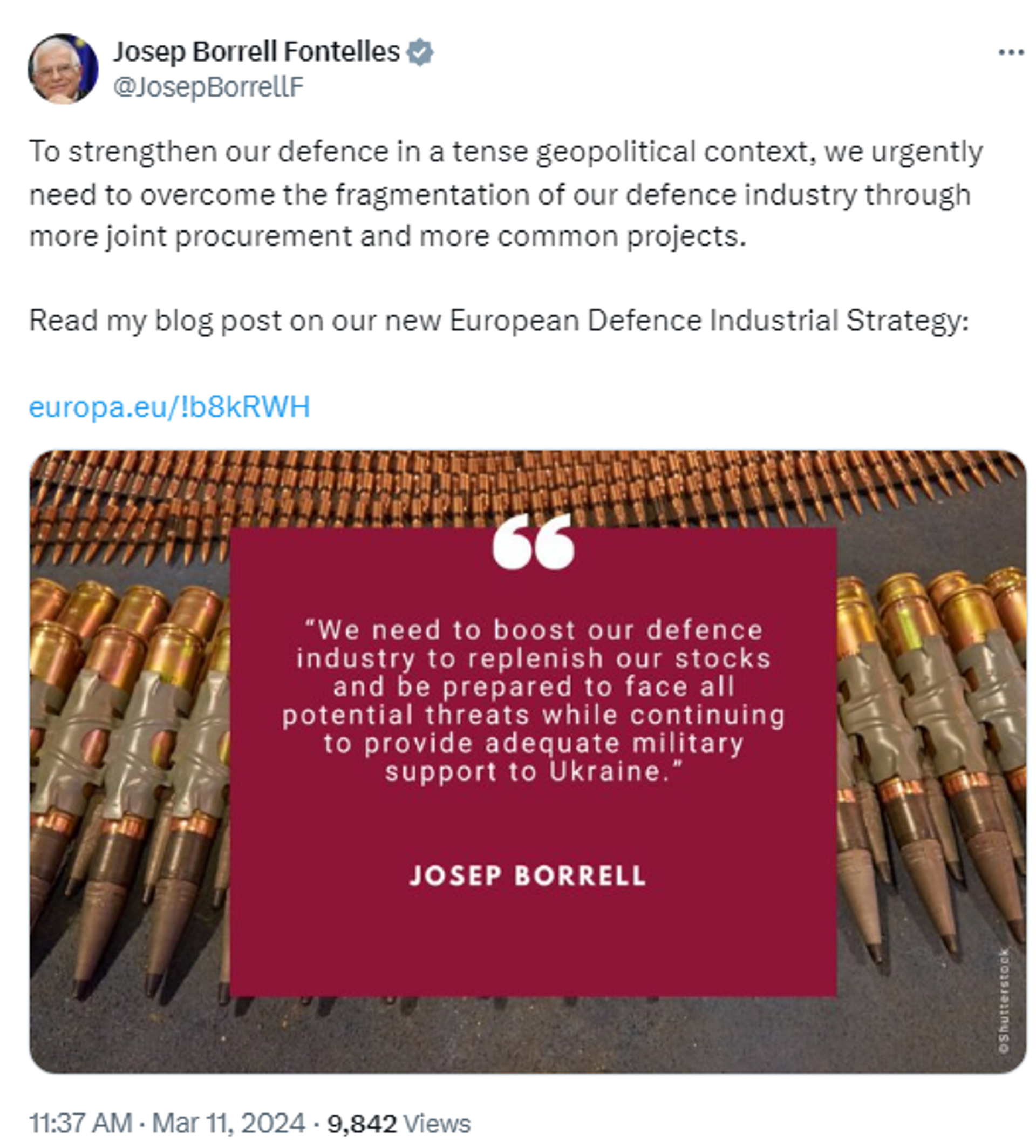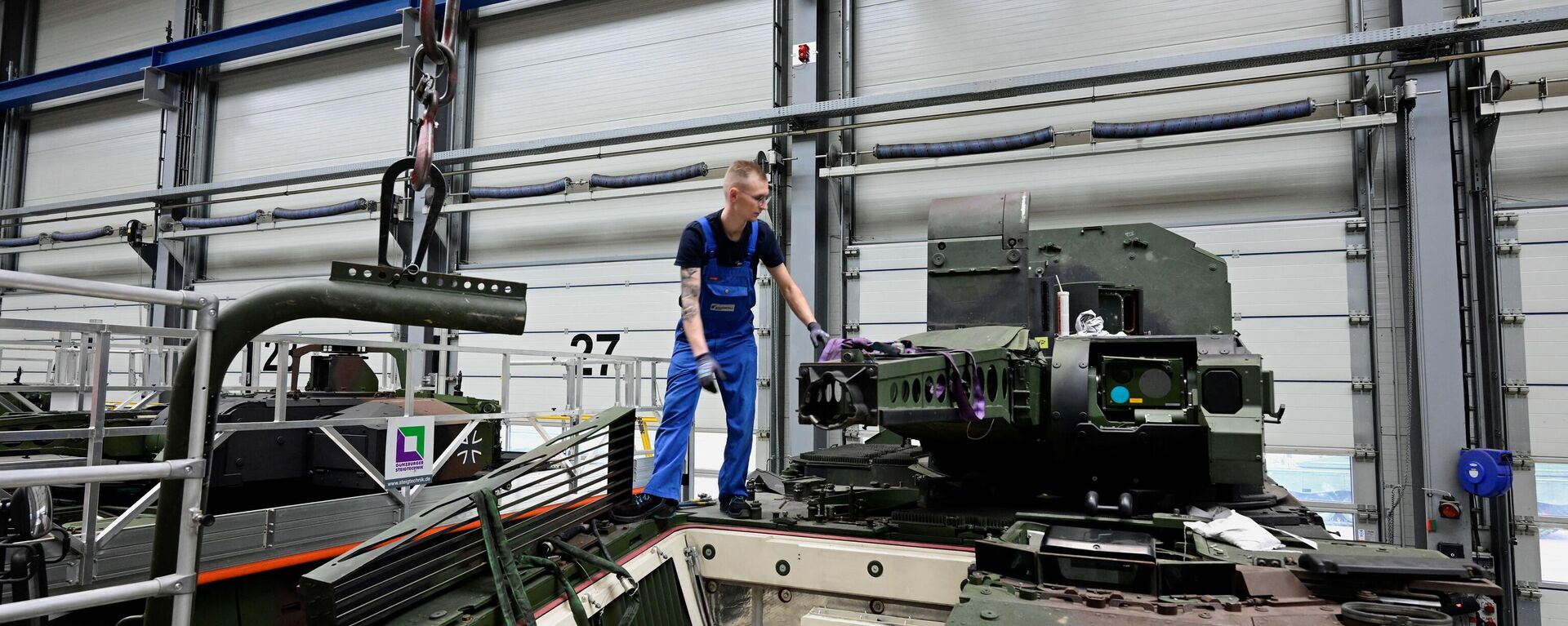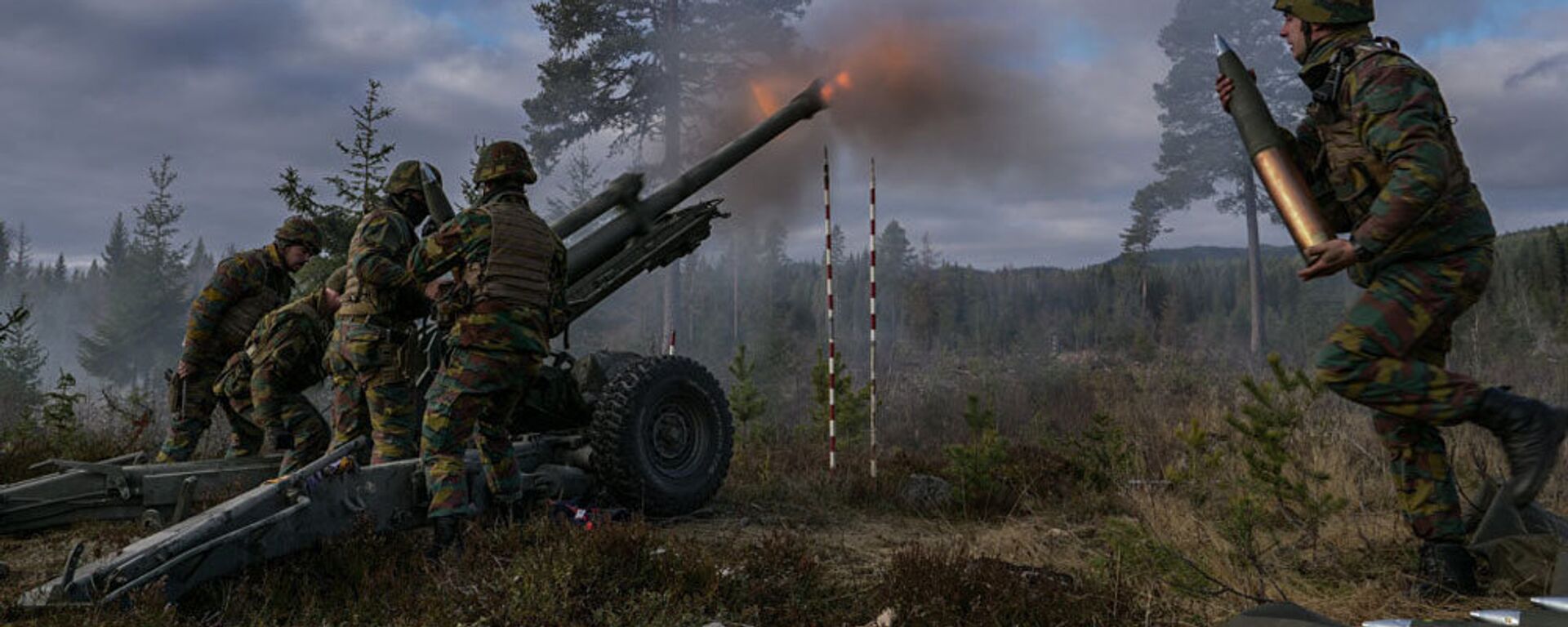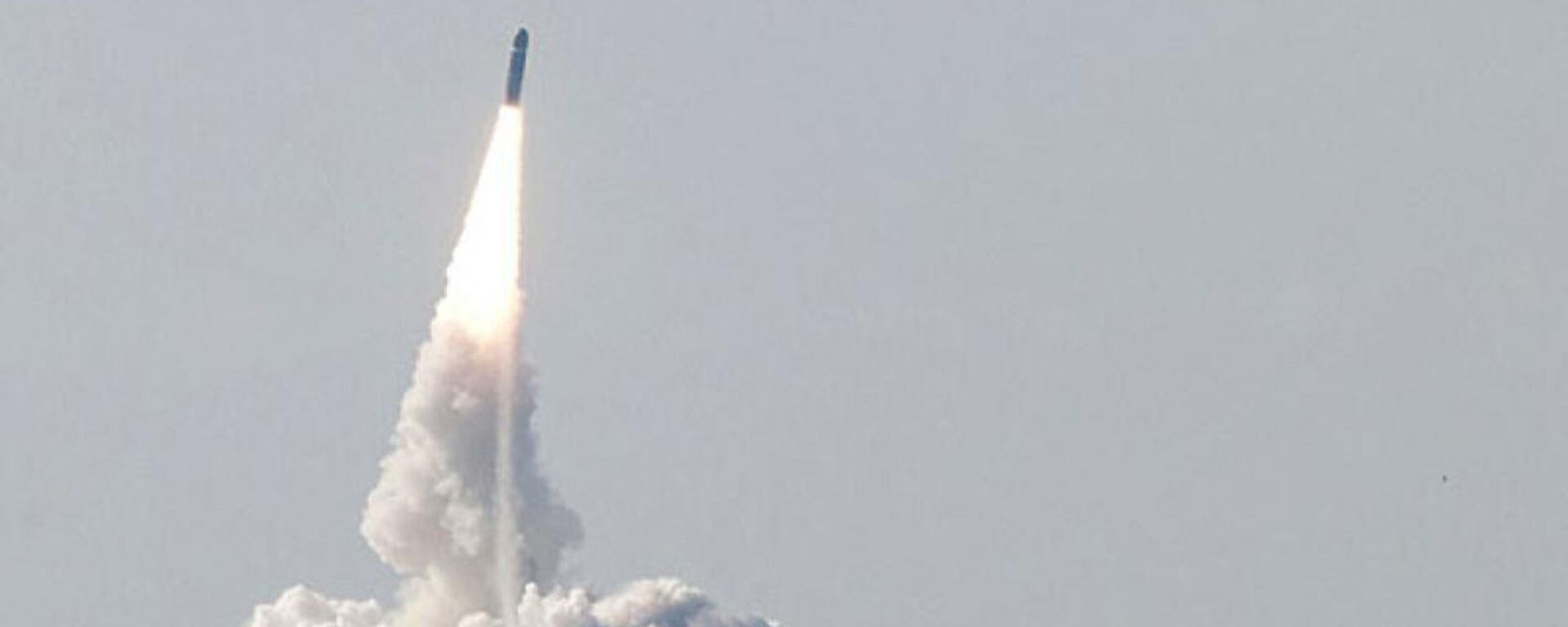https://sputnikglobe.com/20240311/warmonger-eus-defense-strategy-a-wishful-dream-without-hope-of-realization-1117264510.html
'Warmonger' EU’s Defense Strategy a Wishful Dream Without Hope of Realization
'Warmonger' EU’s Defense Strategy a Wishful Dream Without Hope of Realization
Sputnik International
The European Commission’s newly-proposed strategy to coordinate its military industries is a pipe dream, Colonel Jacques Hogard, who served 26 years in the French Army as an airborne officer in the Foreign Legion, told Sputnik.
2024-03-11T14:10+0000
2024-03-11T14:10+0000
2024-03-11T14:11+0000
analysis
josep borrell
european union (eu)
nato
military & intelligence
defense industry
https://cdn1.img.sputnikglobe.com/img/07e8/03/06/1117160453_0:160:3074:1889_1920x0_80_0_0_2006cb28e44324adc56e440bfe2a20ce.jpg
The European Commission’s newly proposed strategy to coordinate its military industries to tackle the “existential threat” posed by Russia is, above all, a pipe dream, Colonel Jacques Hogard, who served 26 years in the French Army as an airborne officer in the Foreign Legion and the special forces, told Sputnik.The pundit elaborated by pointing to the TIGER III, MAWS, and CIFS programs that were all successively “abandoned by Berlin, either to adopt purely German solutions or to turn to American equipment.”The remaining two programs – SCAF (Future Combat Air System) and MGCS (Main Ground Combat System) – were plagued by “disagreements over the distribution of roles between German and French industries.”Continuing to support Ukraine militarily has left European countries’ existing stocks depleted, EU foreign policy chief Josep Borrell admitted in his latest blog post. He urged moving “from an emergency mode to a longer-term vision, in a new strategy would allow the EU to be able to “replenish our stocks and develop the defense capabilities,” while continuing to provide “adequate military support to Ukraine.”“To strengthen our defense in a tense geopolitical context, we urgently need to overcome the fragmentation of our defense industry through more joint procurement and more common projects,” he wrote.The blog post further elaborated on the new European Defense Industrial Strategy recently unveiled by Brussels. The European Commission, the EU’s executive branch, touted its plan worth around €1.5 billion (US $1.6 billion) as a way to turbocharge the bloc’s military-industrial sector. The strategy is geared to reduce the EU member states’ dependence on the US for defense needs. Procurement outside the bloc was declared "no longer sustainable."The plans will need to be approved by the European Parliament and by member countries, who are already squabbling over military and weapons spending on Ukraine aid.Franco-German relations have spiraled since the summer of 2023, with personal tensions running high between President Emmanuel Macron and German Chancellor Olaf Scholz, Hogard pointed out.“The French and German leaders have continued to publicly display their deep disagreements, which result from two opposing visions and two competing ambitions in terms of defense. We can clearly see in these conditions that the European Commission's plan is a wishful dream which is not about to begin to come true even at a minimum," he said, pointing to the "harsh reality of an obsolete European Union, which is very likely not to survive the current crisis."Josep Borrell presented the European Defense Industrial Strategy and European Defense Industry Program (EDIP) in Brussels together with Executive Vice President Margrethe Vestager and EU commissioner for the internal market, Thierry Breton. “The European defense industry is highly concentrated geographically: a few Member States make 90% of the total European defense industry,” Borrell stated. “It supplies around 40% of the needs of the European defense, meaning that our armies are importing the majority of the weapons and equipment they use. For the last two years, “78% of defence acquisition by EU Member States were made outside the EU,” he underscored.The new EU strategy includes reducing purchases of weapons from the United States, but this objective “is also a dream,” whether in the short-term or even mid-term perspective, Hogard said.The EU’s top diplomat talked a big game about the need to jointly “invest more in defense,” but in the current economic crisis this is, again, “wishful thinking,” the pundit suggested.According to Hogard, Borrell was offering a “simple communication exercise,” facing the “reality of their monumental collective failure.”
https://sputnikglobe.com/20240306/eu-proposes-16-bln-plan-to-prop-up-defense-industry-as-stocks-dwindle-1117160961.html
https://sputnikglobe.com/20240304/europe-would-be-out-of-ammo-and-throwing-stones-within-hours-of-major-conflict-general-warns-1117127991.html
https://sputnikglobe.com/20240311/eu-nuclear-umbrella-to-embolden-member-states-to-use-french-nukes-politician-warns-1117251223.html
Sputnik International
feedback@sputniknews.com
+74956456601
MIA „Rossiya Segodnya“
2024
News
en_EN
Sputnik International
feedback@sputniknews.com
+74956456601
MIA „Rossiya Segodnya“
Sputnik International
feedback@sputniknews.com
+74956456601
MIA „Rossiya Segodnya“
european commission’s strategy to coordinate its military industries, eu plan to boost defense production, aid for ukraine, depleted weapons stockpiles, us military aid to ukraine, eu aid to kiev, us military stockpiles depleted, eu military stockpiles depleted, did europe give its weapons away to ukraine, did europe leave itself naked sending weapons to ukraine,
european commission’s strategy to coordinate its military industries, eu plan to boost defense production, aid for ukraine, depleted weapons stockpiles, us military aid to ukraine, eu aid to kiev, us military stockpiles depleted, eu military stockpiles depleted, did europe give its weapons away to ukraine, did europe leave itself naked sending weapons to ukraine,
'Warmonger' EU’s Defense Strategy a Wishful Dream Without Hope of Realization
14:10 GMT 11.03.2024 (Updated: 14:11 GMT 11.03.2024) Facing weapons stockpiles bled dry by NATO’s proxy war against Russia in Ukraine, top EU officials laid out their plan for a dramatic overhaul of the bloc’s defense industry last week. The strategy involves getting member states to procure more weapons together and less from the United States, while fully including Ukraine in its plans.
The European Commission’s
newly proposed strategy to coordinate its military industries to tackle the “
existential threat” posed by Russia is, above all,
a pipe dream, Colonel
Jacques Hogard, who served 26 years in the French Army as an airborne officer in the Foreign Legion and the special forces, told
Sputnik.
“The EU, whose initial vocation as a peacemaker in Europe has completely slipped and transformed into a warmonger, is seeking to exist, in the face of the visible disengagement of the United States in Ukraine. It clumsily tries to find a way out of the trap into which the Americans have made it fall. But in reality, 'defense Europe' is a dream. Born from a desire to bring the Franco-German couple together, this dream has never had the slightest beginning of concrete realization,” Hogard stated.
The pundit elaborated by pointing to the TIGER III, MAWS, and CIFS programs that were all successively “abandoned by Berlin, either to adopt purely German solutions or to turn to American equipment.”
The remaining two programs – SCAF (Future Combat Air System) and MGCS (Main Ground Combat System) – were plagued by “disagreements over the distribution of roles between German and French industries.”
“These programs were pushed through under pressure from politicians, without their future being assured,” Jacques Hogard said.
Continuing to support Ukraine militarily has left European countries’ existing stocks depleted, EU foreign policy chief Josep Borrell admitted in his
latest blog post. He urged moving “
from an emergency mode to a longer-term vision, in a new strategy would allow the EU to be able to “replenish our stocks and develop the defense capabilities,” while continuing to provide “
adequate military support to Ukraine.”
“To strengthen our defense in a tense geopolitical context, we urgently need to overcome the fragmentation of our defense industry through more joint procurement and more common projects,” he wrote.
The blog post further elaborated on the new European Defense Industrial Strategy recently unveiled by Brussels. The European Commission, the EU’s executive branch,
touted its plan worth around €1.5 billion (US $1.6 billion) as a way
to turbocharge the bloc’s military-industrial sector. The strategy is geared to reduce the EU member states’ dependence on the US for defense needs. Procurement outside the bloc was declared "
no longer sustainable."
The plans will need to be approved by the European Parliament and by member countries, who are already squabbling over military and weapons spending on
Ukraine aid.
Franco-German relations have spiraled since the summer of 2023, with personal tensions running high between President Emmanuel Macron and
German Chancellor Olaf Scholz, Hogard pointed out.
“The French and German leaders have continued to publicly display their deep disagreements, which result from two opposing visions and two competing ambitions in terms of defense. We can clearly see in these conditions that the European Commission's plan is a wishful dream which is not about to begin to come true even at a minimum," he said, pointing to the "harsh reality of an obsolete European Union, which is very likely not to survive the current crisis."
Josep Borrell presented the European Defense Industrial Strategy and European Defense Industry Program (EDIP) in Brussels together with Executive Vice President Margrethe Vestager and EU commissioner for the internal market, Thierry Breton.
“The European defense industry is highly concentrated geographically: a few Member States make 90% of the total European defense industry,” Borrell stated. “It supplies around 40% of the needs of the European defense, meaning that our armies are importing the majority of the weapons and equipment they use. For the last two years, “78% of defence acquisition by EU Member States were made outside the EU,” he underscored.
The new EU strategy includes reducing purchases of weapons from the United States, but this objective “is also a dream,” whether in the short-term or even mid-term perspective, Hogard said.
“It is obviously not achievable with the wave of a magic wand. As far as France is concerned, its industrial dependence, due to the policy of alignment pursued for decades with the USA, particularly since the Sarkozy presidency, has greatly increased vis-à-vis the Americans. We can no longer count the industrial companies sold off by our successive governments for the benefit of the United States. This is extremely serious and cannot be made up for in a few years," the ex-special forces officer said.
The EU’s top diplomat talked a big game about the need to jointly “invest more in defense,” but in the current economic crisis this is, again, “wishful thinking,” the pundit suggested.
According to Hogard, Borrell was offering a “simple communication exercise,” facing the “reality of their monumental collective failure.”
“When this crisis is over, the current EU will have to give way to a new organization that is truly European but respectful of the Nations that make it up, from the Atlantic to the Urals,” Hogard concluded.






